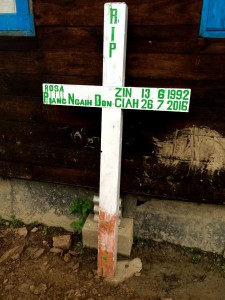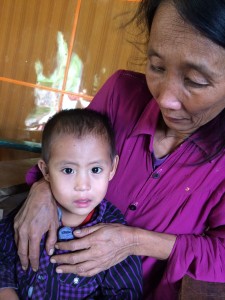To get to her home in Dimpi Village, Piang Ngaih Don would have had to fly from Singapore to Yangon in Myanmar, then take another plane north to the city of Kalay, then catch a bus into the neighbouring Chin state. That last leg alone could sometimes take days to complete.
Piang had told her family she hoped to be back by August – a perilous time for such a trip. The wet season meant that roads leading to Dimpi were often impassable. When the weather was bad, travellers had to be prepared for landslides, fallen trees, broken-down vehicles and traffic mishaps. But Piang, who’d gone to Singapore to be a domestic worker, didn’t seem to mind. Her only worry was that she might not have enough money for transport.
No one from Piang’s family knew exactly why she wanted to get home so badly. Why could she not wait until the dry season when the roads were better? Perhaps the single mother missed her two-and-a-half-year-old son too much. Maybe she couldn’t get used to life in a new country. Or maybe, as she’d told her sister, she really was unwell.
They’ll never be able to ask her now. Piang died in late July, two weeks after telling her sister she wanted to go home. Her employers – a mother and daughter – have been charged with her murder. According to local reports, she was found with bruises on her body – a sign that she had been abused.
*
We heard the news about Piang while we were filming Myanmar. For months, we’d been following a young former domestic worker from that country, as she awaited the outcome of a criminal case against her Singaporean employer.
Like Piang, Naw Sar Gay Say came from an impoverished family. Like Piang, she desperately wanted to give the people she loved a better life.
Gay Say told us her employer slapped her the day she started work, for failing to arrange pillows properly. The woman, it seemed, had anger issues. Her domestic worker was a convenient target.
“As time went on, she didn’t just hit me with her hands.” Gay Say said. “For instance, if she was near a chair, she would throw the chair at me.”
She called a government hotline three months after starting work. The police came and took her away.
At a shelter for domestic workers, Gay Say told social workers a secret her recruiter in Myanmar had instructed her never to reveal: she was just 17.
*
By the time we met Gay Say, we’d already interviewed five other underage Myamerese domestic workers.
A babyfaced 15-year-old told us she decided she wanted to go home only days after starting work. The job was just too difficult. An 18-year-old said she ran away after her employer took off all his clothes and demanded that she massage him. Two girls said they were beaten, pinched and slapped by their employers. Another young woman told us she climbed out the window of a seventh storey apartment after enduring months of sexual abuse.
But what were these girls even doing in Singapore? The local law stipulates that all domestic workers have to be at least 23-years-old. How were they getting their work permits?
We had our answer when the 15-year-old showed us a copy of her passport. Her recruitment agent in Myanmar had bribed immigration officials to change her birthdate. It didn’t matter when she was actually born. In Singapore, she was 23, because her passport said so.
*
In Myanmar, we debated over whether we should pay Piang’s family a visit. We’d heard from a reliable source that she was 24. Her story didn’t quite fit our investigation. But as more details of her death started emerging, our instincts told us we had to find out more.
It took us two days to get to Dimpi. We arrived after a harrowing ride down some treacherous roads. We could hear the wailing even before we saw Piang’s family home. Villagers showing us the way said her sisters were inconsolable. They were waiting for their brother to return with her body.
“Now that she’s gone, how am I going to look after her son?” Piang’s older sister, Ciang Lam Man said several times. She couldn’t stop shaking.
Piang had left her boy with her sister when she went to work in Singapore. It was clear Ciang doted on her nephew, who sat quietly by her side throughout the interview. The boy had a bad cold and a temperature but didn’t make a fuss. Ciang explained that there were no doctors in the village, no medicine. The nearest place they could go to for help was a two-hour drive from Dimpi, in good weather.
It’s hard to overstate just how remote this place is.
“Money,” one of Piang’s relatives told us, “is rare here.”
He didn’t mean they were poor, even though this clearly was the case. He meant that money – notes and coins – was not something they often saw. The villagers lived off their land and ate whatever they could grow or raise. There was very little buying or selling in Dimpi. Money was rare.
At night the family served us a meal of chicken, eggs and rice, and refused to join in when we asked. Later, walking through their kitchen, we saw some women eating corn off the floor. We wondered about our own dinner earlier on. What were these villagers foregoing in order to take care of us?
*
It’s easy to understand why a young woman like Piang felt she had to leave Dimpi. Poverty grinds you down. Almost every villager we met suffered from a cold, cough or bad throat. There was no running water, and very little to eat. Piang’s older sister was bone-thin. Her leathery skin felt almost brittle.
This was prime hunting ground for unscrupulous agents in search of easy targets. Villagers introduced us to two teenagers who’d nearly gone to Singapore too. Pau Deih Lun and Man Deih Hau were 16 and 18, and had followed a recruiter all the way to Yangon, before changing their minds.
When we spoke to the girls, it seemed blindingly obvious that neither was suited for a job in a strange new country. They didn’t know any language other than their Chin dialect, and they’d never worked outside their village before.
But the agent didn’t seem to mind at all. Neither did the woman who’d sent Gay Say to Singapore, nor did recruiters of the many teenagers we’d met at the shelter.
*
There’s a standard, and apparently legal practice that’s accepted across the employment industry in Singapore – agents typically take between six to 10 months’ salary from each domestic worker they place. This is then shared with their counterparts in Myanmar.
To the unscrupulous recruiter, the rewards make up for the risks. Why exclude underage girls, when for a small fee, government officials are happy to alter birthdates on passports?
Myanmar banned its citizens from seeking domestic work overseas in late 2014, but an agent told us that for yet another fee, airport staff will let women, who would never be able to afford a holiday overseas, pass through Immigration using “Tourist Visas”.
So the rules are there, there’s even a ban in place. It’s just, not many people seem to care.
*
 The morning before we left Dimpi, Piang’s sisters showed us the cross they’d prepared for her – a simple white crucifix, with her name and birthdate painted on it.
The morning before we left Dimpi, Piang’s sisters showed us the cross they’d prepared for her – a simple white crucifix, with her name and birthdate painted on it.
June 13, 1992. She really was 24 when she died.
And yet, something didn’t seem to make sense. Later on, it hit us. Piang had left Myanmar in May 2015, one month shy of turning 23. She wasn’t a minor, but she was also not old enough to be a domestic worker in Singapore.
A photocopy of Piang’s passport proved what we’d suspected. Her birthdate had been changed – to April 13, 1992.
Did Piang even realise she was too young for the job? Maybe her agent told her it was a small problem, easily fixed with a bribe to the right government official. But therein lies the tragedy – if they’d been a bit more patient, if corruption was not so rampant in Myanmar, if someone in Singapore had discovered the truth, Piang might still be alive today.
Maid in Singapore airs this week on 101 East, Al Jazeera. Watch the trailer here.


